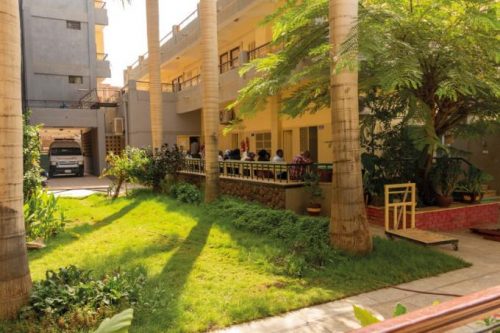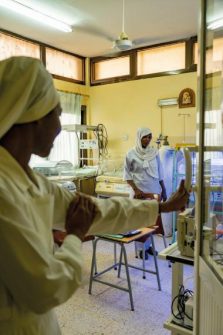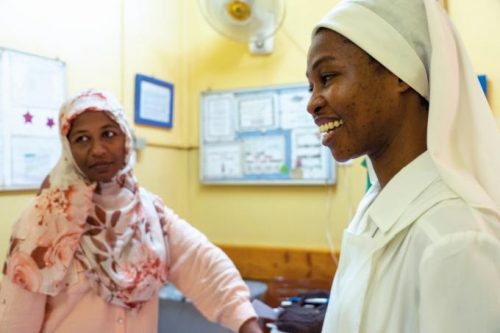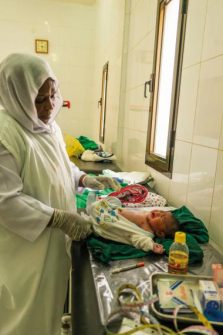Sudan. St Mary’s Hospital in Khartoum. At the service of Life.
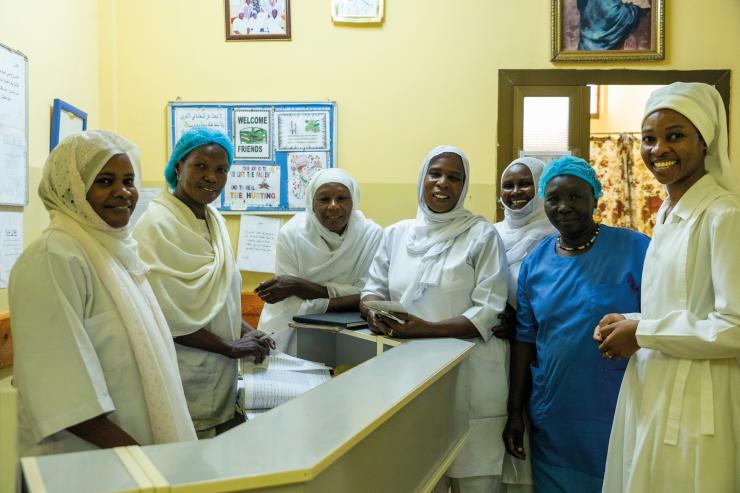
St. Mary’s Hospital is located in the Arab market district of Khartoum. More than 300 children are born in this structure every month. We visited the Centre.
Six Comboni missionaries of five different nationalities work there full time. The nuns are supported by a large team of 132 people, including seven doctors, 22 midwives, 23 nurses, 12 specialized caregivers, four anesthetists, three hematologists and several other people assigned to different services. The medical staff is composed mainly of women, as seems logical in a maternity hospital in an Islamic country.We went to visit the hospital and the Mozambican sister Albertina Marcelino, who is the staff coordinator, accompanied us.
First we visited the pharmacy, which is open 24 hours a day. The sister assured us that fortunately the hospital does not suffer from lack of medicines, and that, although it is a maternity hospital, people also go to the structure to buy medicines. Nearby the pharmacy there is the laboratory, whose main function is to provide the results of clinical tests as quickly as possible, and is also provided with a blood bank in order to deal with emergencies.
Upon leaving the inner courtyard, we found a group of mothers with their babies. They were there for periodic checks and for the vaccination program for mothers and children, which are provided every Tuesday and Saturday. Sister Albertina greets them in Arabic, caresses some of the babies and then confirms that, “All these children were born
in this hospital”.
The prenatal reception room is on the first floor. There we met Sister Erminiade of Italian origin, who is in charge of filling in the registration form of mothers-to-be. The St. Mary’s Maternity Hospital has never made a distinction between Muslim or Christian, Sudanese, South Sudanese, Ethiopian or Eritrean women. All of them are welcome and receive equal service at the centre. Sister Albertina told us that the sisters of the hospital offer particular help to women from poor families who cannot afford to give birth to their baby in a hospital. Therefore, approximately 30% of women enjoy partial or total assistance, depending on their economic situation. The sister, who is in charge of being in touch with the families of these women to know their real situation, decides about the level of support to offer them.
Those women who can afford to pay for the services of the St. Mary’s Hospital represent the remaining 70%, and their contribution is essential for the maintenance of the hospital. Many of these women get prenatal check-ups in the St.Mary’s Maternity Hospital, while others are followed in health centres located in the city and only go to St. Mary’s to give birth to their baby. They generally register themselves in advance, although some may arrive without prior notice.
The delivery rooms are the heart of the St Mary Hospital. We met, in the adjoining waiting room, a young woman of Eritrean origin who was very close to giving birth for the first time. You could see the joy in her eyes for her future motherhood and at the same time a shadow of fear for the pain she knew she would suffer during childbirth. We were also able to talk, thanks to the simultaneous translation of Sister Albertina, with two Sudanese women, a mother-to-be and her aunt, who were in another waiting room of the hospital. The hospital has three perfectly equipped delivery rooms and an operating room for caesarean sections or for complicated deliveries.
There are also intensive care rooms equipped with incubators. One of the rooms is antiseptic and only nurses have access to it.
In the case of premature births, or when babies have a particular problem, at least two nurses attend to them 24 hours a day. The sterilization rooms and the laundry, which are kept running at full capacity, are in the basement. The clothes arriving from the delivery room are subjected to particular sterilization. The sisters are aware that hygiene is essential, in fact 33 people are assigned to this service. In addition to the daily cleaning and systematic sterilization of medical equipment, a sterilization protocol is followed once a month for the sensitive places in the hospital. Sister Albertina talked to us about her work and that of the Comboni missionaries at the hospital: “I happened to observe that in many places the poor are often ignored or neglected. As a missionary and nurse I try to show with my work that there are no differences between people. Our hospital welcomes and serves all the mothers and new born babies with equal human and professional dedication regardless of their ethnic, social, economical or religious diversities, because the mere fact of being people already gives them full dignity”.Just before leaving the hospital, we met a young paediatrician, Adiba, who had just finished tending to a new-born baby girl. Another ‘daughter’ of St Mary´s Hospital.
Enrique Bayo

